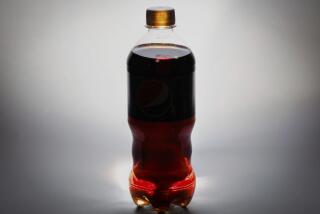Sugar Substitute: Diet Aid?
- Share via
Dieters today have more options than ever as they try to shed unwanted pounds. They quench their thirst with diet sodas, binge on diet chocolate pudding and pig out on diet frozen desserts--most of it artificially sweetened with low-calorie aspartame.
But does aspartame really help with weight loss? Or does it actually increase appetite, as some researchers have suggested?
“There’s a lot of confusion about these questions among both the general public and scientists,” said Barbara Rolls, director of the Laboratory for the Study of Human Ingestive Behavior at Johns Hopkins University.
To help end the uncertainty, Rolls reviewed results from 45 studies that examined the effect of aspartame on hunger and appetite. She concluded that the artificial sweetener doesn’t boost eating and may help dieters avoid fattening foods. Her review appeared in the Journal of Clinical Nutrition.
“The studies haven’t found an increase in food intake (with the use of aspartame),” she said. “And there was no increase in body weight.”
But neither did consumption of aspartame-sweetened foods or drinks automatically translate into weight loss. “If you choose a low-calorie aspartame-sweetened food and then use it as an excuse to eat a slice of chocolate cake, it won’t help in losing weight,” Rolls said.
Since its approval, first as a table-top sugar substitute in 1981 and then as a sweetener for carbonated drinks in 1983, use of aspartame has grown steadily. Today, Americans consume about one ounce of aspartame--the amount found in about 900 cans of diet soda--per capita per year, according to the Calorie Control Council, a trade group representing manufacturers of artificial sweeteners.
Aspartame is 200 times sweeter than ordinary table sugar. But the artificial sweetener contains protein, which keeps it off-limits to individuals born with a rare, genetic disease called phenylketonuria, or PKU. People with the disease, which afflicts one in every 14,000 infants, must avoid phenylalanine, an ingredient in aspartame.
Some experts warn that children should consume only limited amounts of aspartame. But a study published last year in the journal Pediatrics found that learning, math, social interaction and mood were unaffected in 20 healthy children ages 9 and 10 who drank aspartame-sweetened beverages at lunch.
As with adults, aspartame does not appear to increase appetite or food intake in children, according to two studies by Lee Ann Birch and her colleagues at the University of Illinois at Urbana-Champaign. The 44 preschoolers, ages 2 to 5, drank either a beverage with sugar or aspartame 20 minutes before dinner. Those whose drinks contained aspartame consumed the same number of calories at dinner as a comparison group that drank water.
But the children who drank sugar-sweetened beverages decreased their calories at dinner by an average of 120 calories--the amount included in the drink.
And what did they cut out at dinner? Said Birch: “Vegetables and foods that they said they liked the least.”





